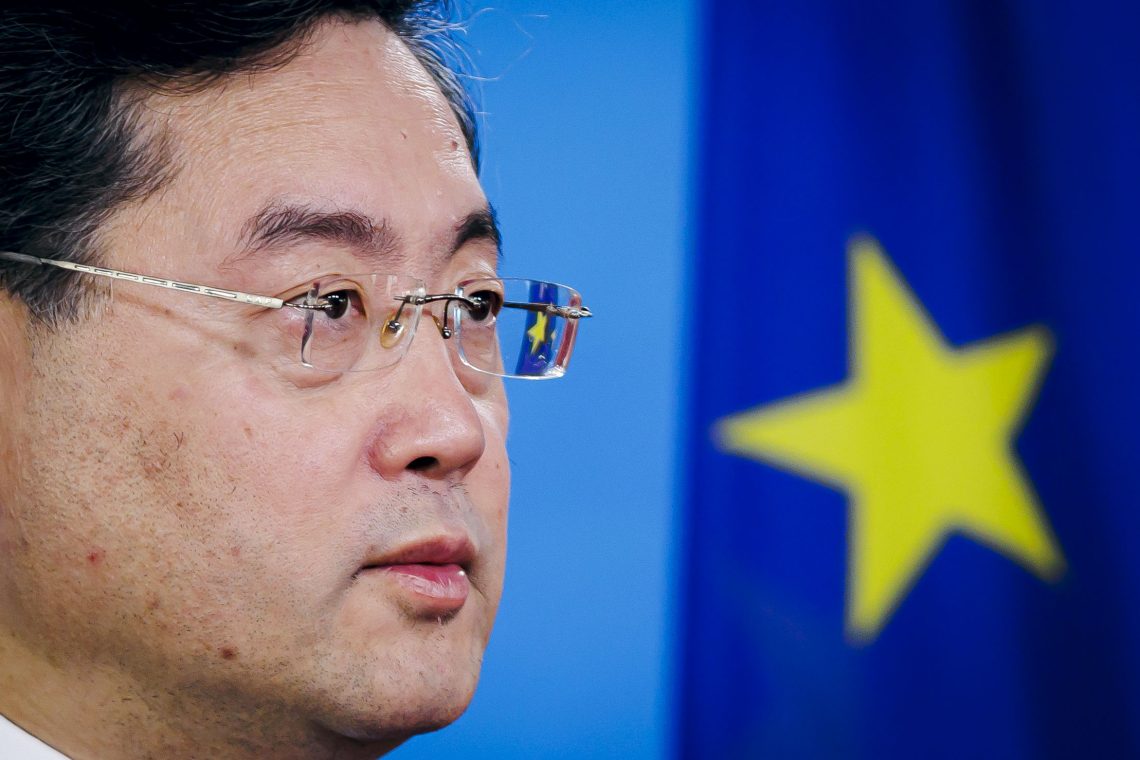What a foreign minister’s disappearance tells us about Xi’s China
A closer look at Qin Gang’s ouster reveals internal disputes in China’s top-level leadership as President Xi tries to maintain total control over foreign policy.

In a nutshell
- Qin Gang was dismissed after just six months as China’s foreign minister
- A rumored affair and clumsy political maneuvers led to his dismissal
- The case sheds some light on the workings of Xi Jinping’s inner circle
Qin Gang was China’s foreign minister for a mere six months. After a public appearance on June 25, 2023, he disappeared for an entire month. Official statements from the Chinese side initially attributed his absence to “health reasons.” But after this vanishing act, Mr. Qin was dismissed from his position on July 25. In his place, former Foreign Minister Wang Yi, who also holds the title of director of the Foreign Affairs Office of the CPC Central Committee, resumed the role.
Such a turn of events is unusual in China’s political landscape, especially after the 20th National Congress. A trusted ally of President Xi Jinping, Qin Gang climbed the diplomatic ranks of the Chinese Communist Party (CCP) with unparalleled speed. After a tenure of just over a year as the Chinese ambassador to the United States, he was inducted into the Central Committee. By the end of December 2022, he was appointed foreign minister. He officially began his ministerial duties in January 2023. Come March, during the National People’s Congress, 56-year-old Qin Gang was also appointed as a state councilor. This made him the youngest individual to hold such a rank within the CCP. This meteoric rise, involving two promotions within three months, is a rarity. For context, it took Wang Yi five years as foreign minister before becoming state councilor.
Xi seeks loyalty above all
President Xi tends to handpick key figures for each ministry. He wants the Ministry of Foreign Affairs to align seamlessly with his vision. To achieve this, he selects officials whose personal loyalty to him is beyond question.
Qin Gang once served as President Xi’s chief protocol officer, managing all his foreign visits. They were often seen together at official events. For instance, during President Xi’s 2015 U.S. visit, Mr. Qin was the sole official accompanying him, other than security personnel and an interpreter, during his tour of the Boeing plant in Seattle.
As protocol officer, Mr. Qin was remarkably committed to upholding President Xi’s image. In a July 2023 interview, Pavel Slunkin, a former Belarusian diplomat, reminisced about a surreal incident when the Chinese diplomat requested to inspect a museum at 2 a.m. on the day before an official visit. Despite the late hour, Mr. Qin was determined to ensure everything was prepared, meticulously counting steps on the museum staircase, and inquiring which step President Xi would touch at the precise moment the music would start.
Qin Gang’s wife, Lin Yan, may also have played a role in her husband’s meteoric rise to power. Known for her diplomatic prowess, she shares a close bond with President Xi’s wife, Peng Liyuan. Such interpersonal dynamics likely play a role in President Xi’s appointments.
Xi expects total loyalty
In late 2018, Mr. Qin became closely acquainted with television presenter Fu Xiaotian. They reportedly became involved, despite both being married. Consequently, a surrogate in the U.S. gave birth to a son for them in November 2022. However, things soured between the two when Mr. Qin refused to seek U.S. citizenship for their child, against the mother’s wishes.
By March 2023, when Mr. Qin ascended to the position of state councilor, he ceased all communication with Ms. Fu. Rumors suggest that Ms. Fu, aggrieved, reported her lover to the Central Commission for Discipline Inspection in May. By June, an inquiry was underway, and in July the Politburo Standing Committee decided upon punitive action. Xi Jinping was finally informed about the affair.
It is worth noting that President Xi holds stricter standards than his predecessors concerning the personal lives of officials. For top-tier officials, their private affairs are not just a matter of personal ethics but are intertwined with politics. President Xi also worried about potential security breaches during Mr. Qin’s meetings with his lover.

However, the Fu Xiaotian incident was not the sole factor in Mr. Qin’s downfall. His relative youth and limited experience made it difficult for him to mesh with various factions, even within the foreign ministry itself. Additionally, in his early months as foreign minister, he unsettled many influential figures within the ministry by probing into corruption linked to foreign aid. This bold move did not sit well with many of his peers.
Moreover, shortly after assuming the role of foreign minister, Mr. Qin dismissed Zhao Lijian, the ministry’s renowned “wolf warrior” spokesman. However, it seems the new minister underestimated Mr. Zhao’s clout. Not only was the latter valued by Wang Yi, but he also had the backing of President Xi.
Diplomats’ discontent with Qin Gang became evident during the Aspen Security Forum on July 19. When attendees questioned Xie Feng, China’s ambassador to the U.S., regarding Mr. Qin’s whereabouts, the diplomat ambiguously responded with “Let’s wait and see,” followed by a broad, seemingly mocking smile.
Xi protects his image above all
While several factors may have precipitated Qin Gang’s removal from office, one significant incident was the foreign ministry’s delayed response to U.S. President Joe Biden’s characterization of President Xi as a “dictator.” The underwhelming reaction could have ruffled feathers within the CCP. Additionally, Mr. Qin’s European tour as foreign minister failed to make much of an impression.
The turbulence within the Foreign Ministry put Qin Gang in a precarious position. President Xi was challenged by top-level officials, compelling him to make the tough decision of sidelining his ally.
More by Junhua Zhang
Prospects for the yuan unseating the dollar
China’s export controls are set to backfire
President Xi is extremely sensitive to any political narrative that questions his personal decisions. To punish Mr. Qin would imply that the Chinese leader had made a mistake in appointing him. This would therefore be a delicate matter to handle for the CCP. The government merely stated that Mr. Qin had been “removed,” avoiding stronger phrasing like “dismissed.”
However, the gravity of the incident was manifest on the foreign ministry’s website. Following the announcement, all mentions of him were removed. While they reinstated records of his tenure within two days, his name remains conspicuously absent from the list of past foreign ministers.
Scenarios
Xi as the sole decision maker in Chinese foreign policy
The sidelining of Qin Gang accentuates the ministry’s fragility and dependency on President Xi’s directives. Looking ahead, it is likely that the Chinese leader will not entrust substantive foreign policy decisions to the foreign minister, reinforcing his solo steerage of an increasingly assertive foreign policy.
The nature of President Xi’s centralized rule implies that any significant policy rectification would necessitate him personally acknowledging and addressing the flaw, tantamount to admitting fallibility.
Enduring influence of politicians close to Xi
Though Qin Gang has had to step down from his role as foreign minister, he remains state councilor. Speculation is rife regarding his eventual fate. On September 19, The Wall Street Journal published an investigation stating that “senior Chinese officials were told that an internal Communist Party investigation found former Foreign Minister Qin Gang to have engaged in an extramarital affair.”
Wang Yi’s renewed appointment as foreign minister suggests an unwavering commitment to President Xi’s diplomatic stance, which prioritizes countering the U.S. and aligning with Russia.








